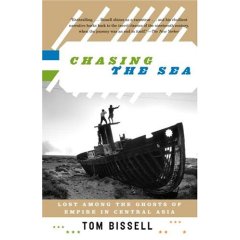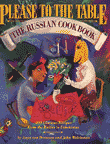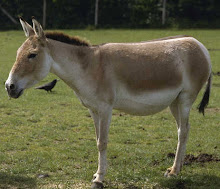 Journalist Tom Bissell’s Chasing the Sea: Lost Among the Ghost of Empire in Central Asia, a non-fiction travel history and memoir, turns out to be less about the death of the Aral Sea (shared by Kazakhstan and the NW Uzbekistan region of Karakalpakistan), and more about the culture, politics and history of the people of Uzbekistan. Bissell was an abject failure as a Peace Corps volunteer in Uzbekistan -- he had a total physical and emotional breakdown and left within the first six months of his tour. Revisiting those ghosts, he returned to Uzbekistan five years later (in 2001) on assignment to write an article about the Aral Sea (his conclusion -- the Uzbek side is a lost cause). Before he ever gets to Karakalpakistan, though, Bissell visits Samarkand, Bukhara, his Peace Corps host family, and makes a side trip through Kyrgystan for the funeral of an Uzbek mountain climber. He ponders on the influence of a fierce and unforgiving environment on the development of bloody and corrupt empires (both past and present). It’s well-written and engaging, with occasional wise observations and laugh-out-loud ironic comments.
Journalist Tom Bissell’s Chasing the Sea: Lost Among the Ghost of Empire in Central Asia, a non-fiction travel history and memoir, turns out to be less about the death of the Aral Sea (shared by Kazakhstan and the NW Uzbekistan region of Karakalpakistan), and more about the culture, politics and history of the people of Uzbekistan. Bissell was an abject failure as a Peace Corps volunteer in Uzbekistan -- he had a total physical and emotional breakdown and left within the first six months of his tour. Revisiting those ghosts, he returned to Uzbekistan five years later (in 2001) on assignment to write an article about the Aral Sea (his conclusion -- the Uzbek side is a lost cause). Before he ever gets to Karakalpakistan, though, Bissell visits Samarkand, Bukhara, his Peace Corps host family, and makes a side trip through Kyrgystan for the funeral of an Uzbek mountain climber. He ponders on the influence of a fierce and unforgiving environment on the development of bloody and corrupt empires (both past and present). It’s well-written and engaging, with occasional wise observations and laugh-out-loud ironic comments.Though they share a fairly long border, Uzbekistan and Kazakhstan do not share the exact same histories. The cultures spread along the Silk Road touched the southern parts of Central Asia, only occasionally moving through what is now Kazakhstan. Kazakhstan was long populated by nomadic groups, moving to the best grazing areas with the seasons. Nomads are notoriously hard to govern -- as Hugh Pope writes in Sons of the Conquerers, you can’t rule (or convert) people you can’t find. Further south, away from the steppes, the people were more settled, which gave rise to cities, trade, science, architecture, more religion and a different kind of literary culture. Even the music has a different sound and purpose -- urban vs. nomadic. But that’s a different book review altogether . . .
I’ve been musing on the state of Central Asian scholarship, at least as it is published in English. In the past decade or so (since the fall of the Soviet Union), most research and writing on the region has been done by scholars trained in Soviet studies (Martha Brill Olcott, a fine thinker and scholar, is an example), so their insights and analysis are virtually always from the Russian perspective. A few researchers approach the region from the Islamic or Turkic perspective, either fretting about Islamic fundamentalism, or seeing all speakers of Turkic languages as little cousins of Turkey. A small, but hopefully growing, new breed of Central Asian scholars is emerging. Their interest begins in Central Asia -- from Kazakhstan, Kyrgistan, Uzbekistan -- and radiates outward from that center. Tom Bissell’s book is an example of this viewpoint. His interest in Central Asia comes solely from his experiences in Uzbekistan, so all of his research, scholarship and writing radiates from that center. Two places for Central Asian-centric thinking are Registan ("All Central Asia, All The Time"), a blog with politics and cultural analysis, originated by a former Peace Corps volunteer to Uzbekistan and current graduate student in Central Asia studies, and The Roberts Report, by a professor of Central Asian Studies at Georgetown University. Recently, another website, KZBlog, has revived, with a focus on culture and daily life (as viewed by an American working long-term in KZ). Politics (however entertaining) are not the focus of News from the Caravan -- check out these sites to keep up on the latest events.


No comments:
Post a Comment